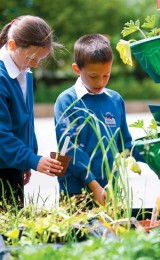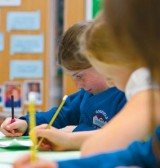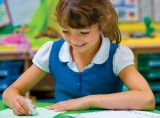Soap opera writers are masters of the emotional hook, says Will Ryan...
Fifty years ago Granada Television launched a new TV show scheduled to run for thirteen weeks. Since that time, Coronation Street has gone from strength to strength. The only time it has failed to secure a minimum of ten million viewers was when it clashed with a broadcast about the death of Princess Diana. Twenty six million witnessed the demise of Alan Bradley under a Blackpool tram and when Deirdre was wrongly imprisoned, questions were asked in Parliament.
![]() An episode of Coronation Street lasts for just 22 minutes and in that time the viewers become emotionally hooked in, cheering the good guys and booing the bad guys. They daren’t leave the settee during episodes. Sadly, I don’t see enough lessons that have the same emotional hook.
An episode of Coronation Street lasts for just 22 minutes and in that time the viewers become emotionally hooked in, cheering the good guys and booing the bad guys. They daren’t leave the settee during episodes. Sadly, I don’t see enough lessons that have the same emotional hook.
Children make sense of their world in two ways. The first is through facts, and schools are good at providing children with facts. The second way is through sensations, passions and emotions and the way in which they are interpreted. Only inspirational teachers create a sense of mood, energy, awe, wonder and appreciation and an awareness of natural order. But how do they do it?
 When Barack Obama was elected President of the USA it was ground breaking news. America was to get their first black president! However, most schools carried on teaching the ‘Ancient Egyptians’ or ‘The Journey of a River’. Certainly one school I visited broke the mould. A teacher had asked her head about using some of the scenes in the film Hairspray to stimulate a thematic study (it would be inappropriate to use the full film). When asked for further information she talked about some of the scenes in the film which looked at racial tensions in Baltimore in the 1960s. Children looked at footage of drinking fountains labelled ‘coloureds only’ and ‘whites only’. They saw views of dance halls that were divided so that people only danced with those with the same colour skin. They watched a march to bring an end to segregated dancing. The project created a tremendous response because the children were emotionally hooked into learning. It all took place in a Y6 classroom under the heading of ‘How did the USA get its first Black President?’. Here are a few other ideas.
When Barack Obama was elected President of the USA it was ground breaking news. America was to get their first black president! However, most schools carried on teaching the ‘Ancient Egyptians’ or ‘The Journey of a River’. Certainly one school I visited broke the mould. A teacher had asked her head about using some of the scenes in the film Hairspray to stimulate a thematic study (it would be inappropriate to use the full film). When asked for further information she talked about some of the scenes in the film which looked at racial tensions in Baltimore in the 1960s. Children looked at footage of drinking fountains labelled ‘coloureds only’ and ‘whites only’. They saw views of dance halls that were divided so that people only danced with those with the same colour skin. They watched a march to bring an end to segregated dancing. The project created a tremendous response because the children were emotionally hooked into learning. It all took place in a Y6 classroom under the heading of ‘How did the USA get its first Black President?’. Here are a few other ideas.
• Instead of studying the Victorians why not study Victorian heroes (who campaigned for reform) and Victorian villains (who didn’t).
• Instead of studying the journey of a river, why not study the story of a river which would include ways man has used and abused a local river.
• Instead of studying World War Two why not study the values, qualities and stories that were necessary in this period.
 When Sir Jim Rose carried out his review of the primary curriculum, the children told him they weretired of the same topics being recycled year after year. They preferred new things to study. They recognised that they would be the generation that needed to solve issues relating to global warming, or what happens when oil runs out and how to live harmoniously in rapidly changing communities. So if we were to build on the notion of emotional hooks as described above, themes children could explore would include:
When Sir Jim Rose carried out his review of the primary curriculum, the children told him they weretired of the same topics being recycled year after year. They preferred new things to study. They recognised that they would be the generation that needed to solve issues relating to global warming, or what happens when oil runs out and how to live harmoniously in rapidly changing communities. So if we were to build on the notion of emotional hooks as described above, themes children could explore would include:
• What is good use and bad use of the internet? (This could explore the issues of cyber bullying which concerns many youngsters.)
• Which part of the school or community would you change? (This could lead to work where the children bring about the change and are responsible for securing and handling a budget.)
• Why is recycling so important? (Or, alternatively, what mustn’t we dispose of in a disposable age?)
Many schools recently made brilliant use of the Royal Wedding. A part of me wishes the children had watched it in school as part of a learning experience, with a holiday at a later stage. However there is a far greater capacity for schools to use significant news events. Sometimes children study earthquakes and volcanoes without reference to real events. It seems to me that few schools used the recent earthquakes in New Zealand or Japan to create a study around the theme ‘What happens when the Earth gets angry?’.
I sometimes hear people say, ‘children must get bored sitting watching the same things on television all day’. There is evidence that youngsters will watch the same things severaltimes over. However, I believe that children have a low boredom threshold and each viewing is through fresh eyes absorbing new details. The example given relating to Hairspray above was particularly successful because it was part of the popular culture of the children at the time. More recently some schools made brilliant use of the film The Boy in Striped Pyjamas by using is as the basis for a thematic study of some of the events in World War Two.
The British Film Industry website has many fabulous short films that could be used for emotionally triggered learning. Here are two you might like to consider: Killing Time at Home and The Dangle, both of which have now appeared on YouTube.
The use of such approaches has been shown to have a significant impact on boys’ writing (for more details type ‘visual literacy’ into Google).
 If we as teachers don’t give our children a sense of awe and wonder, can we be certain that it will come from elsewhere? After all these years, much of the best learning is a sensory experience. Children should go into the woods in autumn to feel and kick up the leaves and to build shelters. They should feel the frost on their finger tips in winter and the wind and the rain n their face. They should be taken to locations where there is evidence of both natural beauty and man made beauty.
If we as teachers don’t give our children a sense of awe and wonder, can we be certain that it will come from elsewhere? After all these years, much of the best learning is a sensory experience. Children should go into the woods in autumn to feel and kick up the leaves and to build shelters. They should feel the frost on their finger tips in winter and the wind and the rain n their face. They should be taken to locations where there is evidence of both natural beauty and man made beauty.
• However, teachers often ask how to make the best use of these opportunities. Here are a few simple ideas;
• Complete a sensory trail whereby they move around the location with a simple proforma with the following prompts: What can I see? What can I hear when I close my eyes? What can I feel with my hands? What smells are in the air? Are there any taste sensations?
• Alternatively, ask the children to write a powerful sentence beginning with each letter of the alphabet. Here is an example I recently found from a visit to a coastal location.
A deep mist settled on the cliff top.
Below me I can hear the crashing of waves.
Caw Caw screech seagulls from the nearby
harbour.
Dampness and salt can be tasted on your lips.
• Finally, never doubt the power of sketching whilst completing the sensory trail. It opens up a different from of communication, representation and expression.
Somebody once asked for a definition of wisdom and got the response ‘it is knowing what to do, when you don’t know what to do’. It seems to me that the only way we can achieve this it through greater provision of emotionally triggered learning. I hope you have enjoyed this series of articles about inspirational teaching and always remember that the difference between a person achieving their potential and exceeding it is inspiration. Good luck.
Use coaching to turn failures into learning success
Ace-Classroom-Support
Pie Corbett’s bike poems
Topic
Teaching five year olds to talk
Ace-Classroom-Support
